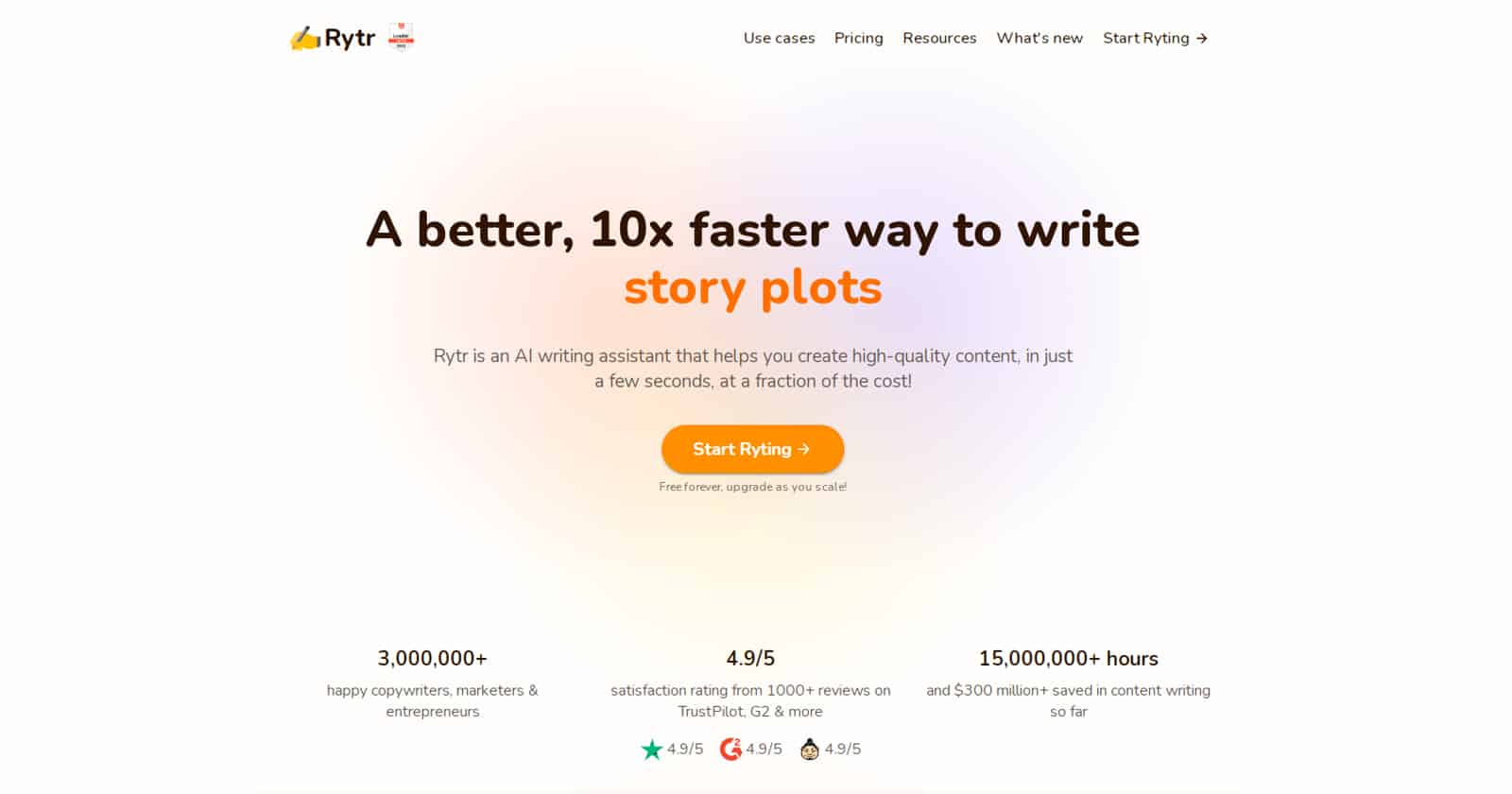KWFinder Alternatives: 10 Great Alternatives to KWFinder for Better Keyword Research
Discover the best KWfinder alternatives to take your keyword research game to the next level. Compare features, pricing, and more to find the perfect tool for your needs.
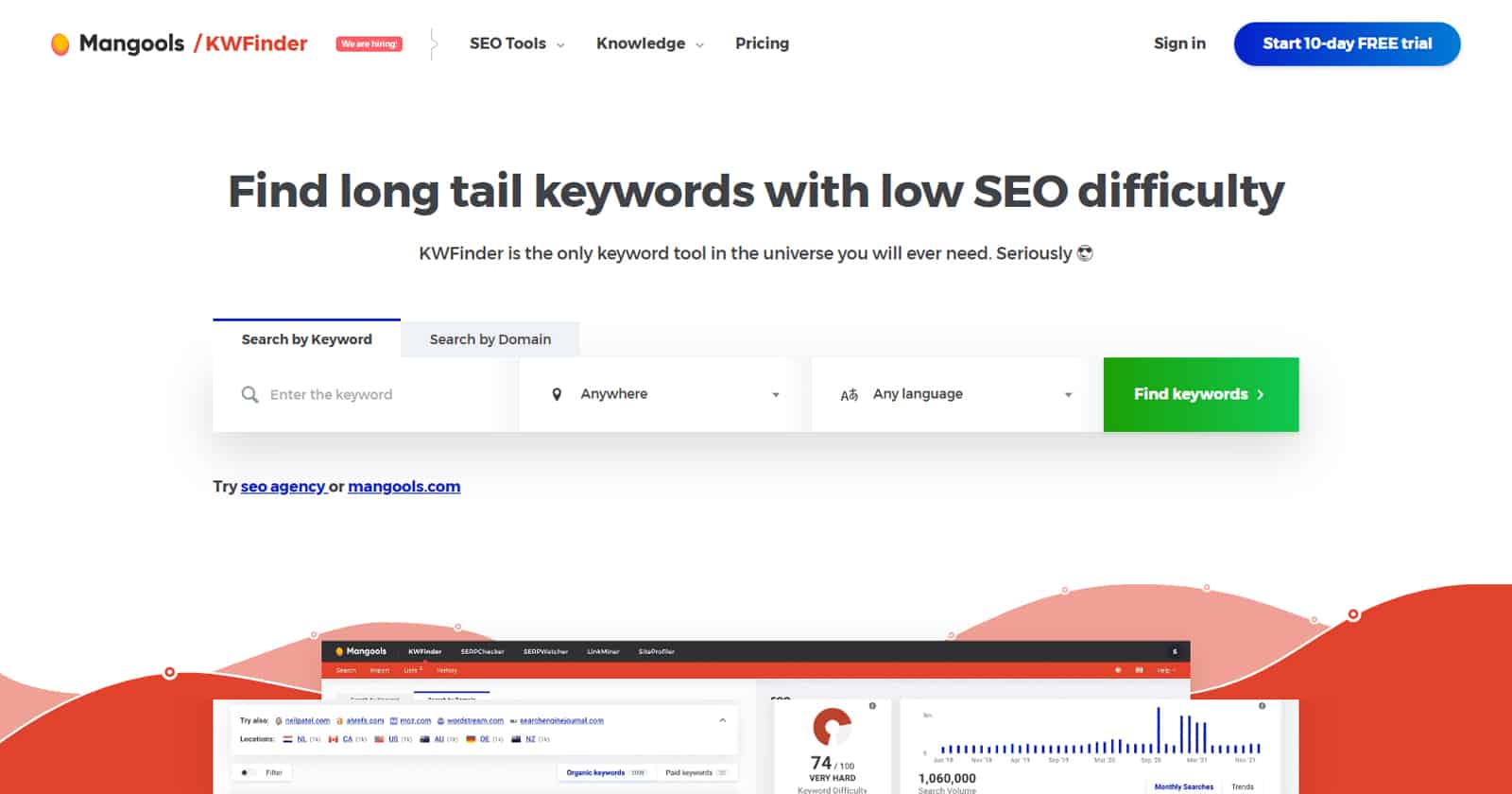
Keyword research is a crucial aspect for a successful SEO strategy. It helps businesses understand their target audience’s search behavior and find relevant keywords to optimize their website. While KWfinder is a popular and effective keyword research tool, it may not prove to be the best fit for everyone. Whether it’s the pricing or the features that don’t meet your needs, several KWfinder alternatives offer unique features, pricing models, and functionalities. In this blog post, we’ll take a closer look at the top KWfinder alternatives and help you find the best tool to help you take your SEO strategy to the next level.
What is KWFinder?
Contents
A search marketing keyword research tool, KWFinder, provides the necessary keywords, generating additional keywords for a website’s position. It provides insight into the pay-per-click (PPC) advertising competitive landscape and a proprietary index value for SEO difficulty. SEO and paid search campaign creation are both possible with the help of the KWFinder tool.
It lets you manually make lists of keywords based on their current and historical search volume, estimated cost per click in paid search, difficulty in paid search as determined by the PPC index, and difficulty in SEO as determined by the KD index. The tool works well for keywords with a lot of traffic in the market. It will be the tool of choice for SEOs who frequently require keyword research.
KWFinder is straightforward and simple to use. The tool immediately provides a list of related or complementary keywords along with an overview of the metrics for each once you enter a seed keyword or a list of them. To assist you in determining a keyword’s significance, the tool provides estimates of its search volume, click prices, estimated traffic levels, and the difficulty of both PPC and SEO. SERPWatcher, a tool that lets you see the search results for a keyword and identify the people who appear in them, is directly integrated with KWFinder.
Also Read: 10 Best Hootsuite Alternatives To Try In 2024
Limitations of KWFinder
- The data becomes unreliable if you’re looking at very specific niche keywords or if you’re in a small market
- The tool probably has little value for paid search marketers because it doesn’t do much more than the free Google Keyword Planner does
- Lack of multi-tabbed keyword research as you will only be able to use one tab at a time to find keywords
If you are looking for a better alternative to KWFinder, here is a list of some of the best SEO tools that you can give a try. Online marketing professionals vouch for these KWFinder alternatives.
Best KWFinder Alternatives (Free & Paid)
Semrush (Paid)

For business customers, Semrush is the best alternative to KWFinder. Amazon, Tesla, Apple, and Samsung are just a few of the world’s biggest brands that make use of it.
Semrush is an all-in-one online marketing platform with features comparable to those of an enterprise. Although it is somewhat pricey and requires a little bit more training than some of the other tools on this list, there is no better choice for large businesses with substantial budgets.
Entering the domain of your closest rival into the search box is the simplest way to get started with Semrush. Then, select the location from which you want to obtain the data (globally, US, UK, etc.). Semrush will display a wealth of domain-specific analytical data once you hit the search button. View the Organic Keywords after scrolling down to the Organic Research section to see an overview of their traffic and ranked keywords.
All of their most important metrics, including their average ranking position, can be found here, along with the most popular keywords that are driving traffic to their website. Add some interesting keywords to your own SEO strategy if you find some that are attracting a lot of website visitors for your rival and you think you could compete for them.
You can find a list of other websites that rank for relevant topics in your niche by going to the Competitors tab from there. Repeat for an almost endless supply of potential keyword ideas by clicking on any of these websites to view their top organic keywords as well. If you like, you can start with a seed keyword or use the Keyword Magic tool to get ideas from Semrush’s database of more than 20 billion queries.
Features
- Backlinks analytics
- Traffic analytics
- Social Media poster and tracker
- Link building tool
- Access to various tools like domain vs. domain
- CPC map
- Site Audit
- Brand Monitoring
- keyword difficulty
- SEO writing assistant
Pros
- The Semrush competitor analysis feature is extremely helpful (estimate their traffic, find their top performing keywords, know their backlinks, and so on)
- The “CPC Map” helps you easily discover the average CPC in your industry across different states or regions of a country
- Offers you everything you need for effective keyword research (from keyword magic tool to keyword difficulty to topic research, you have everything)
- With Advertiser Research, you can analyze сompetitor ad budgets and keywords
- SEO Writing Assistant, which suggests relevant keywords for your content to boost your search rankings
- Site Audit feature, which provides you with a comprehensive report that lists all the critical errors found on your site (ranging from broken links to missing alt tags to long meta descriptions, and so on)
- Semrush has a huge database of more than 18 billion keywords that is updated frequently
Cons
- When compared to KWFinder, Semrush’s monthly pricing, which starts at $119.95, is expensive. However, Semrush gives you access to forty additional SEO tools all under one roof.
Pricing
- Pro plan costs $119.95 per month
- Guru plan costs $229.95 per month
- Business plan costs $449.95 per month
Suitable For
Semrush is the ideal alternative to KWFinder if you’re looking for an all-in-one SEO toolkit with the largest keyword database available.
Also Read: Top 13 Keywords Everywhere Alternative Tools In 2024
Serpstat (Paid)
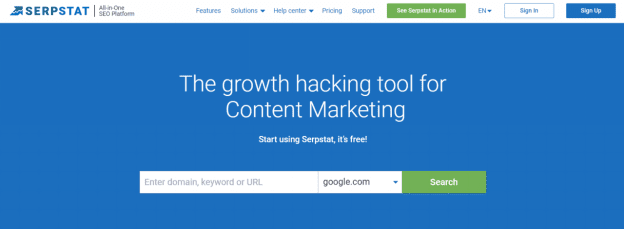
Serpstat is yet another excellent alternative to KWFinder. It strikes a good balance between features and price. Serpstat is an all-in-one SEO software suite with tools and a powerful keyword research feature. However, in contrast to Mangools, which provides a total of five SEO tools, Serpstat provides a whopping thirty or more tools to assist you in all aspects of your marketing activities.
Quickly coming up with new concepts is made easy by the built-in keyword research tool. Serpstat will show you a list of similar or related keywords that you can sort through if you start with a seed keyword, which is a broad topic related to your niche.
You can also use Serpstat’s keyword research tool by entering the domain of your competitor into the search bar. This will bring up a comprehensive analysis with suggestions for your own search campaigns and the keywords they are ranking for.
You will be able to see all of the essential parameters you need to evaluate keyword ideas, such as the average monthly search volume, the difficulty of the keyword, the competition, and other factors. You can also use the Keyword Trends tool to come up with even more concepts based on the most popular search terms. You can also zoom in on specific countries to find keywords that are popular all over the world.
The Competitor’s Graph feature makes data visualization simple. By displaying the various domains competing for a given keyword and related queries in a bubble graph, it gives you an idea of how competitive they are. A website with larger bubbles commands a higher level of visibility in the search engine results pages (SERPs) for that topic and lets you see who your biggest rivals are. You can use Serpstat to analyze and monitor your backlink profile, track your rankings, audit your website, and a lot more in addition to keyword research. It has a lot of features for a low price.
Features
- Keyword research which helps you find profitable keyword ideas
- Backlink analysis to find backlink sources of any site
- Rank tracker which helps you with keyword rank tracking
- Site audit tool which helps you find and fix your site issues
- Keyword clustering tool (to group highly relevant keywords together
- Domain analysis tool to analyze any domain in the world
Pros
- Text Analysis tool enables you to easily optimize the content on your page to rank for a group of clusters rather than keywords
- Pricing plans are excellent when compared to other similar competitor research tools like Ahrefs, Semrush, and Moz
- Site Audit tool enables you to easily optimize your website’s technical SEO
- It also provides a free version to assist you in researching keywords, analyzing competitors, and so on with daily limits
Cons
- It does not provide any social media data
Pricing
- Lite plan costs $69 per month
- Standard plan costs $149 per month
- Advanced plan costs $299 per month
- Enterprise plan costs $499 per month
Suitable For
Anyone looking for a low-cost, all-in-one SEO toolkit can benefit from Serpstat’s extensive keyword and backlink database.
Ahrefs (Paid)

Ahrefs also supports traditional keyword research as well as research based on competitors. Its backlinking profile and analysis have been its stronghold for a long time. It has access to a rich links database, and their system is so proactive and quick that it can crawl more than 6 billion pages every day. That’s about every current website that exists online today. As a result of its evolution, Ahrefs now offers an excellent collection of outstanding SEO tools. Additionally, Ahrefs can inform you of your keyword’s traffic potential. It estimates the number of monthly visits you could get by using a top-ranking keyword by analyzing the organic search traffic for that keyword. Similar to the majority of other keyword search tools, Ahrefs divides your keyword suggestions into three main categories.
You will be able to access data on keywords with the same terms as your target keyword, all of the keywords for which the top ten pages are ranking, and autocomplete-based search suggestions. Ahrefs does not have a SERP data tool like KWfinder does. However, it shares the Site Explorer tool with SEMrush and has a competitor-based research tab. It gives you access to information about the domain’s backlinks, domain authority (one of the industry standards), paid traffic (good for AdWords), and organic traffic. Their accuracy in estimating organic keyword traffic, difficulty level, position, and search volume is unparalleled.
They are empowered by the fact that they can support more than 100 countries and monitor at least 130 million keywords only in the United States. Its backlink explorer will show you which links boost your rival’s website the most. You can access values on pages with the majority of backlinks, pages with broken links, anchor texts, referring domains, and outgoing links through it. You can also make use of the handy tool Alerts, which, among its many useful features, will notify you of the most recent keywords.
With its Content Explorer tool, Ahrefs has you covered if you don’t know where to begin building your content. Content Explorer searches the web and compiles a list of the articles that have received the most social shares, organic traffic, and referring domains. The site audit feature of Ahrefs can also be used to find lagging and bug issues on your website and offer suggestions.
Features
- Site explorer for domain analysis
- Keywords explorer for keyword research
- Site audit for performing website audits
- Rank tracker for tracking your keyword rankings
- Content explorer for discovering and analyzing top-performing content in your niche Domain comparison for comparing multiple domains at once
- Link intersect tool for finding sites linking to your competitors but not to you
- Content Gap tool for finding keywords your competitors
Pros
- Accurate keyword data, such as search volume, difficulty, CPC, and so on, can be found in Ahrefs’ Keywords Explorer
- The majority of their tutorials give you insider tips on how to get more out of Ahrefs
- They update their databases frequently
- Their interface is better than most of their competitors
- Ahrefs also offers a WordPress plugin that performs content audits and monitors your backlinks
- SEO toolbar can be used to examine Google SERPs and check SEO metrics for any website
Cons
- Ahrefs does not offer any free trials. A seven-day trial is available for $7.
- Ahrefs has a pricey basic plan that starts at $99 per month
Pricing
- Lite plan costs $99 per month
- Standard plan costs $179 per month
- Advanced plan costs $399 per month
- The Agency plan costs $999 per month
Suitable For
Ahrefs may be a good option for you if you are looking for a tool that is simple to use and provides precise keyword data.
AnswerThePublic (Freemium)

AnswerThePublic is a cutting-edge interface and extremely intriguing tool for keyword research. It can help you find a lot of keywords that your rivals didn’t use. It performs a little differently than the majority of the other tools we examined. AnswerThePublic will show you the questions people are asking about a given topic if you search for a broad keyword or topic. It displays search engine autocomplete data in a useful visual format and bases its suggestions on that data. In mind-maps, keyword suggestions are displayed.
You’ll see question terms related to your seed keyword at the top. The map’s various branches correspond to distinct question terms, such as “what,” “how,” and “who.”
Prepositional phrases, comparison searches like “seed keyword” versus “related keyword,” etc., can be found below that. On one page, hundreds of ideas are frequently displayed. It’s great for getting ideas for your response posts and FAQ pages because many of the keyword suggestions are question phrases.
Answer The Public gets its data directly from Google and other search engines, if that’s what you’re looking for. Their tools, as they put it, “listen in” to search engine autocomplete data, revealing whatever people have searched for. Answer The Public constantly searches through this data, selecting “useful” phrases and questions to record in a database. Simply entering one or two relevant keywords is all that is required to use Answer The Public. Then a treasure trove of customer insights will be revealed. The results are arranged by why, how, what, when, are, and so on in subtopics.
The best part is that you can filter and pivot in the exported CSV file, allowing you to digest the data in any way that works for you. Alternatively, if you need tools for visualization, go back to your Answer The Public dashboard and look at the insights using their simple and complex visualization options. In addition, you can export high-resolution images of the tool’s visualizations for easier referencing, presentation, and sharing if you enjoy them so much.
Features
- Unlimited searches
- Add as many users as you want
- Compare data over time
- Export data in CSV
- Hide branches and suggest keywords
- High-resolution images
- Priority customer service
Pros
- The ability to export your keyword data is better
- Provides data in an appealing, unique format for visualization
- You can find a lot of useful keywords related to any topic
Cons
- Does not provide any other keyword metrics like difficulty, volume, or CPC
Pricing
- Free plan
- Pro plan costs $99 per month
Suitable For
AnswerThePublic is the best option for you if you’re looking for a fun and easy-to-use tool to quickly generate content and keyword ideas.
SpyFu (Paid)
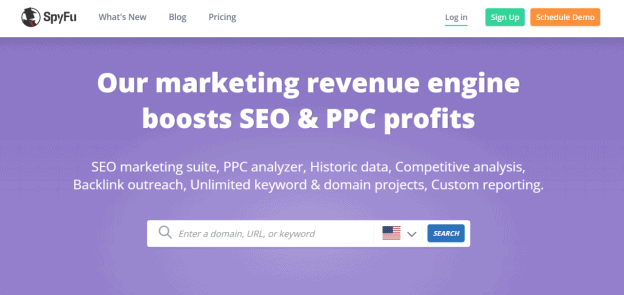
SpyFu is a fantastic alternative to KWFinder, particularly if you are looking for a competitor research tool for SEO. It is another established player that has developed over time. SpyFu, which began as solely a competitor research tool, now offers a comprehensive keyword research suite, comparable to KWFinder. It has a lot of advanced features, such as a PPC analyzer, custom reporting, historical data, and extremely detailed keyword data.
SpyFu advertises itself as a comprehensive tool for domain and keyword analysis devoid of data-heavy dashboards. It is an excellent choice for smaller businesses that want to concentrate on the essential metrics that will propel them to the top of Google’s search results. SpyFu also excels at providing a snapshot of competitor activity to larger brands. In this regard, the availability of historical data is a significant benefit. SpyFu is likely to complement a more comprehensive set of SEO tools for these larger businesses.
SpyFu also focuses on performance metrics from the outside. For instance, it does not crawl websites to assess their technical SEO health. SpyFu encourages the user to piece together the causes by starting with the symptoms (ranking positions). To get the full picture, you might need to use this tool in conjunction with a specialized technical SEO crawler. There is a lot of data here, and it can be very helpful, but users have to play with and evaluate the numbers in order to get this information. Despite the fact that they frequently lack this variety of data, other platforms are simpler to use.
The SpyFu dashboard is well-organized, with a top-level navigation bar and tabs for SEO, PPC, Keyword, Backlinks, the List Builder, Tracking, and Reports. SpyFu’s keyword research tool is powerful enough to compete with other SEO tools and has some exclusive features that set it apart from the competition. It’s a huge plus that historical data for all subscription plans are included. Considering the erratic nature of SEO ranking positions, this longer-term perspective is very welcome. You can also use the handy filters to see only keywords whose ranking position has changed recently, allowing you to take immediate action.
Features
- Unlimited access to all metrics for both SEO and PPC
- Can export unlimited data
- Unlimited searches for backlinks
- Can perform unlimited searches for keywords
Pros
- Pricing plans start at just $33 per month
- Can perform unlimited searches to view all of the data, including a domain overview, data exports, and other features
- User interface is simple
- Easy learning curve
- AdWords Advisory helps discover best buy recommendations for paid keywords
- Can export all the data to Excel, CSV, or PDF
Cons
- It does not include the “mobile rank tracking” feature and does not provide information about social media
Pricing
- Basic plan costs $33 per month if paid annually
- Professional plan costs $58 per month if paid annually
- Team plan costs $199 per month if paid annually
Suitable For
SpyFu is an excellent option for you if you don’t have a lot of money to spend on an all-in-one SEO toolkit and are looking for a KWFinder alternative with a similar budget.
Also Read: SpyFu Review: Features, Pricing, Alternatives And Detailed Pros & Cons
Keyword Surfer (Free)

Are you seeking a free replacement for KWFinder? Make use of the free Chrome extension known as Keyword Surfer. If you’re looking for a free tool for researching keywords, Keyword Surfer is the one for you. More than 100,000 people all over the world use it. Keyword Surfer is the tool for you if you want to conduct keyword research inside of Google Search. Keyword Surfer provides you with the fundamental information you need to increase the visibility of your website if you own a small business or want to increase the number of visitors to your professional blog.
Additionally, Keyword Surfer simplifies research. To get started, you don’t need a lot of experience. In essence, all you need to do is pretend to be looking for the content you want to publish. To search for keywords related to your farm near Austin, Texas, you might, for instance, type “Austin microgreens.” The number of times people search for that term will be shown to you in the Keyword Surfer results. It will also suggest related search items that might help search engines find your content.
Utilizing Keyword Surfer prior to writing content for a blog post or web page is ideal. However, having a general plan that you intend to stick to is helpful. Before Keyword Surfer can provide you with useful insights into your SEO strategy, you need to know what subjects you want to cover. If you have the Keyword Surfer installed, you can see the monthly traffic that each keyword receives when you search for it in search engines. It should be noted that this traffic is displayed for the entire domain, not for any specific webpage.
Keyword Surfer displays a list of keywords that are similar to the ones you searched on Google as well as their monthly volume. By clicking the star, these keywords can be copied to the clipboard. The tool is only useful in some places. If you want to reach people in Europe or North America, you can get decent results. However, the tool lacks information regarding local keywords in numerous Asian, African, and South American nations.
Features
- Unlimited keyword ideas
- Datasets from 70 countries
- Export to CSV
- Monthly search volume data for each keyword
- Estimated domain organic traffic
Pros
- Find out the monthly search volume for any keyword with ease
- Completely Free
- Come up with a lot of relevant keyword ideas for any keyword term you search on Google
Cons
- Can’t get competitor information or other keyword metrics like CPC or keyword difficulty
Pricing
- Free
Suitable For
Keyword Surfer is an excellent free Chrome extension if you want to find keyword ideas on the go. It is completely free and to begin using it, all you need to do is download and install the extension in the Chrome browser.
LSIGraph (Paid)

A free LSI Keyword Generator called LSI Graph makes it simple to find all of the terms that are related to your primary keyword. You can select from a list of LSI terms by simply entering the primary keyword for your page. With Search Volume you can find out how often the phrase has been searched in the past year. This is crucial to ensuring that your keywords are current and pertinent to your audience’s interest. Keyword planning is necessary for both content creation and advertising. To ensure that you know how valuable a keyword is, the CPC data is extracted from Google AdWords.
Latent Semantic Value, or LSV, takes into account LSIGraph’s database’s search volume, keyword competition, and traffic potential over the past six years. This algorithm can precisely determine an LSI keyword’s value. The number is between 0 and 100, with 100 being the best and 0 representing the worst. Keywords with a high LSV are likely to be relevant, easy to rank, and popular.
With Google changing to full semantics search, broad LSI watchword arranging will be required to rank high. With LSIGraph premium you’ll approach the mystery vault of important keywords that please your crowd and web indexes. You are granted lifetime access to LSI keywords by LSIGraph. You can now run as many searches as you want with premium access. In addition, they will provide you with features that reveal all of the associated data.
This means that you can use it for advertising and content planning as well as serving it to all of your customers. Features of LSI Graph v2 Upgrade to an LSIGraph Premium account to gain access to all of these cool features. In addition to serving as a tool for keyword research, it can also be used as a keyword planning tool, assisting you in organizing your keyword list for each outline of content and project. Look at the free variant to see the uses of LSI keywords for yourself. What’s more, assuming you conclude that you like it, it’s never beyond any good time to investigate it further.
Features
- Can access an unlimited number of LSI keywords
- Keyword data, including Search Volume, CPC, Competition, and Trend is provided
- Latent Semantic Value (LSV) helps you select highly relevant semantic keywords
- Can conduct a content analysis
- Search History can be exported to PDF and CSV
Pros
- Gives you access to more than 36 million semantic LSI keywords
- Provides accurate search volume data for your keywords
- Simple to locate the content in your niche that performs the best
Cons
- Contrary to KWFinder, which offers SERP analysis, competitor analysis, rank tracking, and other features, this tool is only for keyword research
Pricing
- Basic plan costs $29 per month
- Premium plan costs $59 per month
- Agency plan costs $69 per month
Suitable For
You should definitely give LSIGraph a shot if you want a specific tool for finding highly valuable semantic LSI keywords in your field. You can start with their free version and test out their premium plans if you like them.
KeywordTool.io (Paid)
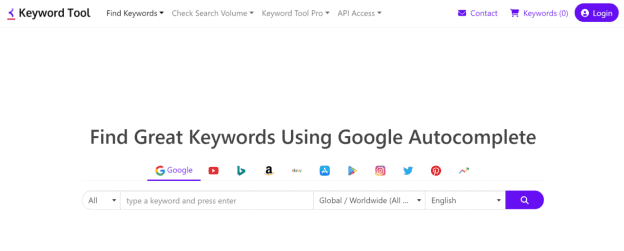
Another straightforward but effective platform for keyword research is KeywordTool.io. It can be used on Google, Bing, Amazon, YouTube, and other search engines to find and analyze keywords. The fact that Keyword Tool’s keyword data is unique is the coolest feature. Like the majority of other tools, it does not rely on data from Google’s Keyword Planner. As a result, you can make use of it to uncover opportunities that your rivals may have missed. Keyword Tool includes competitor analysis and other useful features in addition to keyword research.
You do not need to pay anything or create an account in order to use Keyword Tool. Simply enter a word into the Keyword Tool’s search box and press the “Enter” key to generate hundreds or even thousands of excellent long tail keyword suggestions for your seed keyword. Keyword Tool obtains keywords from Google Autocomplete directly. Because of this, you will be able to locate keywords that Google Keyword Planner does not display. For any subject, this keyword tool can generate thousands of new long-tail keywords. You can also choose to receive hashtag suggestions from popular social media platforms like Instagram and Twitter or keyword suggestions from any popular search engine, such as Google, Youtube, and Bing.
Volume of all searches helps you find the all out month to month scan volume for a specific keyword. This metric indicates the frequency with which your audience searches for your keyword. Use Normal Trend to check to see if your specific keyword is becoming more popular. CPC average provides the typical amount that advertisers must pay a search engine when a user clicks on their advertisement. Typical Competitors demonstrate a keyword’s level of competition. There can be low, medium, or high competition for a keyword.
By targeting long-tail keyword opportunities with low competition and high search volumes, site owners can use this data to get ahead of their rivals. However, the Negative Keywords tool can be used to exclude undesirable keywords if you find that you are receiving irrelevant Google keyword results. For instance, you can use the Negative Keywords box to omit keywords like “iPhone,” “iPad,” and “iMac” if you want to find keywords related to the fruit “Apple”.
Features
- Provides accurate data on Google and Bing search volume
- Discover suggested bids for Google Ads
- Get keyword data from over 192 countries, 47,035 individual locations, and 46 languages
- Can export all of your keyword data into an Excel or CSV file
- Offers a “Negative keywords” filter so you can easily filter out unwanted keyword terms when running organic or paid search campaigns
Pros
- It provides content and keyword ideas for Google, YouTube, Amazon, Instagram, eBay, the Play Store, Twitter, and other platforms
- Can use this tool for free without creating an account to find long tail keywords in any niche. It is a great alternative to free tools like Keyword Planner
Cons
- Their Pro basic plan costs $69 per month, which is a little expensive
- Unlike Semrush and Ahrefs, it can primarily used for keyword research only
Pricing
- Pro Basic costs $69 per month when billed annually
- Pro Plus costs $79 per month when billed annually
- Pro Business costs $159 per month when billed annually
Suitable For
KeywordTool.io is a great option if you’re looking for a single tool to find better keyword ideas on Google, YouTube, Amazon, and other platforms.
Ubersuggest (Freemium)
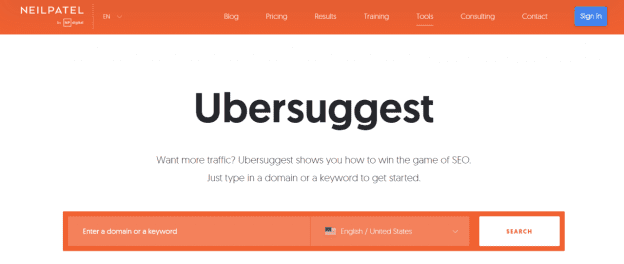
One of the most widely used SEO and content marketing tools is Ubersuggest, which is used by marketers and SEO professionals alike. It gives you one of the largest keyword databases ever and hundreds of millions of ideas for content to help you improve your strategy. It also lets you learn about your competitors’ SEO strategy and fix errors on your website that could be hindering your efforts. There will be a location drop-down menu and a search bar on the first page of UberSuggest. Check to see that you’ve chosen the right country for your search, which will probably be the country where your company is based. If you work for a large company that has operations in multiple countries, you should make the necessary adjustments to this.
To obtain additional information, you can conduct a keyword or domain name search. As my keyword, I’ll be using “UberSuggest.” You will now have access to a lot of information about the keyword, including the cost per click, difficulty levels for SEO and SEM (Search Engine Marketing), and search volume. You can see a more in-depth analysis of the traffic further down, including the volume split between desktop and mobile users and the number of clicks attributed to SEO results versus SEM results.
UberSuggest will approximate the number of backlinks, other websites linking to your website, required to rank among the top ten search engine results. You can additionally separate the thoughts into classifications, for example, Related, Questions, Relational words and Correlations which provide you with a more extensive scope of choices. The segments marked “PD” and “SD” show you the degree of contest for every catchphrase.
The Content Ideas segment is an incredible method for staying aware of your opposition and further developing your Web optimization rankings. You can perceive the number of offers that they’ve had on various stages, the number of backlinks those posts or web journals have, and what kind of traffic they’re getting. The Keyword analyser tells you which watchwords a space is focusing on and the month to month search volumes they accomplish. Once more, you can utilize this for your potential benefit and be extremely exact about which catchphrases you will target. You will see breakdowns relating to the speed of your site and general issues that influence your Web optimization score.
Features
- Keyword suggestions
- Overview of the domain helps with competitor analysis
- Content ideas
- Top SEO page helps you find the best performing pages of your competitors
- Backlink data
Pros
- Provides keyword metrics, including volume, CPC, SEO difficulty, and paid difficulty
- Shows search trend for any keyword for the past year
- Offers a free version, which is great for most beginners
- Daily rank tracking
- Personalized SEO suggestions
Cons
- Similar to the majority of paid tools, such as KWFinder, its keyword data, such as monthly volume or CPC, is inaccurate
Pricing
You can use Ubersuggest’s free version by logging in with your Gmail account.
- Individual costs $29 per month
- Business costs $49 per month
- Enterprise costs $99 per month
Suitable For
Ubersuggest is a great choice if you’re looking for a comparable-priced alternative to KWFinder because their basic plan only costs $29 per month.
SEMScoop (Freemium)
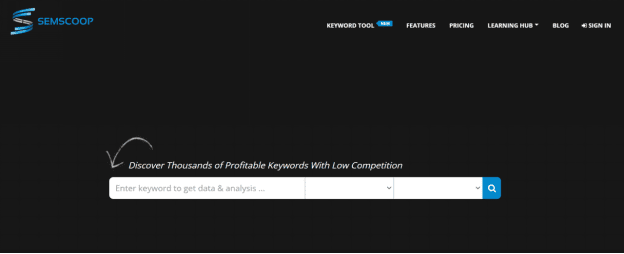
For keyword research, SEMScoop is a powerful, multipurpose tool with high accuracy. It is an excellent SEO tool that can be used against your rivals because it provides advanced SEO metrics and analysis of the competition. You must enter your seed keyword into the SEMScoop keyword data analysis bar, select the appropriate location and language, and click the search button to analyze a keyword.
On the left side, a comprehensive list of potential keyword ideas appears when we enter a keyword. Relevant keywords are displayed alongside an overview of metrics like CPC and PPC, as well as search volume, on the keyword ideas tab. In any keyword research tool, it’s critical to find keywords that are related to your topic. You can get a general idea of how easy or difficult it is to rank for your relevant keyword from the data provided by the keyword difficulty feature. To put it another way, it tells you if a keyword will easily rank in the top ten results of a search engine. A lower difficulty score for a keyword means more chances of ranking.
After finding the keywords you need, you can save and export keywords. After selecting the keywords you want to save, you can create new projects using the save option. You can even add keywords to a project that already exists. You can select the “manage project” option to restore a saved project. By implementing what they lack on their page, you will be able to outrank your rivals using the content analysis tab. The following data are displayed on this tab:
The OnPage Score indicates the degree to which a particular keyword or phrase is optimized on the page. A content that is more focused has a higher OnPage Score.
Content-Length is the number of words that can be on a blog or website. It provides “keyword density” which refers to the ratio of the total number of words on a page to the number of times a particular keyword or phrase appears there.
Features
- Keyword difficulty score
- Data on search volume and CPC
- SERP and links profile
- Social signals
- Content analysis
- Import external keyword list
Pros
- Its interface is very simple to use, and you will get keyword suggestions almost immediately
- It has all the important keyword data in one place such as volume, CPC, and PPC
- It shows you the difficulty score for each keyword term
- It has search seasonality, which makes it easy to see how search interest changes over time
Cons
- Even with their premium plans, you can only get up to 700 keyword ideas
Pricing
- Free plan
- Basic plan costs $9 per month
- Pro plan costs $27 per month
- Business plan costs $47 per month
Suitable For
SEMScoop’s basic plan costs just $9 per month, so if you’re looking for a KWFinder alternative on a similar or even lower budget, you can try it.
Is it Necessary to Invest in a Paid Keyword Tool?
Is it really a good idea to spend money on premium keyword tools when there are numerous free ones available online? Yes, the best keyword research tools are well worth the money. Using premium tools has many advantages, including:
- They typically have larger keyword databases, giving you access to thousands of hidden keywords that free tools don’t have
- They are frequently updated to provide you with new metrics such as search volume and CPC
- They provide premium support and tutorials, which is something that most free tools do not offer
- The majority of free tools don’t give you accurate keyword data, but premium tools usually do, though not always
- While premium tools offer a wide range of metrics like CPC, keyword difficulty, trend, paid data and backlinks data, the majority of free tools only provide keyword suggestions
Therefore, you should definitely make an investment in at least one premium tool if you want to increase your search traffic and sales by finding profitable keyword terms that are simple to rank for.
Wrapping Up
We hope you have found the ideal software with features for keyword analysis and research now that we have looked at all of the alternatives to KWFinder. If not, we suggest signing up for their free trials and giving them a shot. It will certainly assist you in making better decisions. One of the keyword research tools that costs the least is KWFinder. Serpstat is the only product that can match its low cost. It lacks the features of SemRush and is not as effective at competitor research as its rivals. It has a limit on how many keywords it researches and how many requests a heavy user can make. KWFinder is a good tool for keyword research for the money, but if you want more features with a subscription, the above KWFinder alternatives are better for you.
FAQs
Which is the best alternative for KWFinder?
Ahrefs, Serpstat and Semrush are some of the better and well known options instead of KWFinder. For an extensive list, please read the post above.
What are the drawbacks of KWFinder?
When looking at very specific niche keywords, the data becomes unreliable and is of little use to paid search marketers.
Is there a completely free keyword research tool?
Keyword Surfer is a completely free to use tool for keyword research. Many other tools have a trial version which you can try for free for a limited amount of time.






